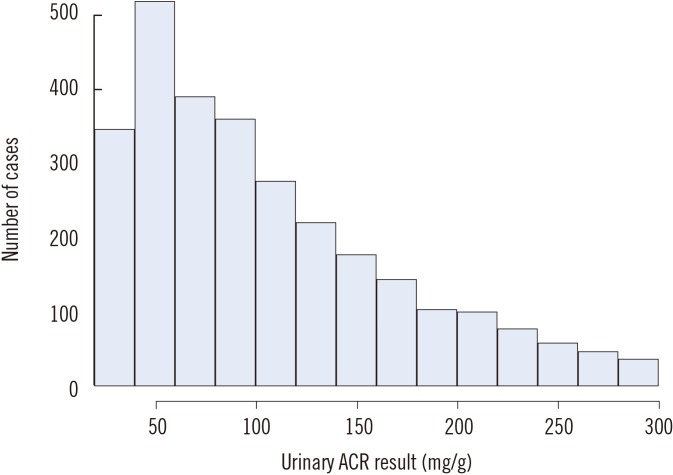Ann Lab Med.
2018 Sep;38(5):420-424. 10.3343/alm.2018.38.5.420.
Proposed Imprecision Quality Goals for Urinary Albumin/Creatinine Ratio
- Affiliations
-
- 1Department of Laboratory Medicine, Hallym University College of Medicine, Hwaseong, Korea. daehyuni1118@gmail.com
- 2Department of Laboratory Medicine, University of Ulsan College of Medicine and Asan Medical Center, Seoul, Korea.
- 3Department of Internal Medicine, Eulji General Hospital, Seoul, Korea.
- KMID: 2434730
- DOI: http://doi.org/10.3343/alm.2018.38.5.420
Abstract
- BACKGROUND
The urinary albumin/creatinine ratio (ACR) is an important indicator of albuminuria. We aimed to estimate ACR uncertainty and its impact on test results and proposed imprecision quality goals based on the estimated uncertainty.
METHODS
The combined ACR uncertainty was calculated using the individual uncertainties of urinary albumin and creatinine. ACR confidence intervals (CIs) were estimated based on the expanded uncertainty. When the CI contained the ACR category boundary (30 or 300 mg/g), the cases were considered ambiguous. Quality goals for ACR were suggested using the number of ambiguous cases among actual patient results.
RESULTS
The number of ambiguous cases resulting from the combined ACR uncertainty was higher than expected based on biological variation (BV) quality goals. When the ACR met BV quality specifications, we estimated that 4.8-15.5% of the results may have been misclassified. To minimize the number of ambiguous results, the minimum, desirable, and optimum quality goals were set at 34.0%, 18.0%, and 4.5%, respectively.
CONCLUSIONS
We expressed ACR uncertainty using the uncertainties of urinary albumin and creatinine and assessed the impact of this combined uncertainty on the test results. Subsequently, we proposed imprecision quality goals for ACR based on ambiguous results.
Figure
Reference
-
1. Lambers Heerspink HJ, Gansevoort RT. Albuminuria is an appropriate therapeutic target in patients with CKD: the Pro View. Clin J Am Soc Nephrol. 2015; 10:1079–1088. PMID: 25887073.2. Currie G, Delles C. Proteinuria and its relation to cardiovascular disease. Int J Nephrol Renovasc Dis. 2013; 7:13–24. PMID: 24379690.3. Rodby RA. Timed urine collections for albumin and protein: “The King Is Dead, Long Live the King!”. Am J Kidney Dis. 2016; 68:836–838. PMID: 27646424.4. Talreja H, Akbari A, White CA, Ramsay TO, Hiremath S, Knoll G. Predicting kidney transplantation outcomes using proteinuria ascertained from spot urine samples versus timed urine collections. Am J Kidney Dis. 2014; 64:962–968. PMID: 25304983.5. American Diabetes Association. Standards of medical care in diabetes-2017: summary of revisions. Diabetes Care. 2017; 40(S1):S4–S5. PMID: 27979887.6. Farrance I, Frenkel R. Uncertainty of measurement: a review of the rules for calculating uncertainty components through functional relationships. Clin Biochem Rev. 2012; 33:49–75. PMID: 22896744.7. Sandberg S, Fraser CG, Horvath AR, Jansen R, Jones G, Oosterhuis W, et al. Defining analytical performance specifications: consensus Statement from the 1st Strategic Conference of the European Federation of Clinical Chemistry and Laboratory Medicine. Clin Chem Lab Med. 2015; 53:833–835. PMID: 25719329.8. Ceriotti F, Fernandez-Calle P, Klee GG, Nordin G, Sandberg S, Streichert T, et al. Criteria for assigning laboratory measurands to models for analytical performance specifications defined in the 1st EFLM Strategic Conference. Clin Chem Lab Med. 2017; 55:189–194. PMID: 27506603.9. Shephard MD, Gill JP. An innovative Australian point-of-care model for urine albumin: creatinine ratio testing that supports diabetes management in indigenous medical services and has international application. Ann Clin Biochem. 2005; 42:208–215. PMID: 15949156.10. Miller WG, Seegmiller JC, Lieske JC, Narva AS, Bachmann LM. Standardization of urine albumin measurements: status and performance goals. J Appl Lab Med. 2017; 2:423–429.11. Levin A, Stevens PE. Summary of KDIGO 2012 CKD Guideline: behind the scenes, need for guidance, and a framework for moving forward. Kidney Int. 2014; 85:49–61. PMID: 24284513.12. Cavalier E, Ferir AM, Delanaye P, Krzesinski JM, Chapelle JP. Measurement uncertainty of creatinine in low values: another good reason not to use the MDRD formula with low creatinine values. Clin Biochem. 2007; 40:285–286. PMID: 17208211.13. Ricós C, Alvarez V, Cava F, García-Lario JV, Hernández A, Jiménez CV, et al. Current databases on biological variation: pros, cons and progress. Scand J Clin Lab Invest. 1999; 59:491–500. PMID: 10667686.14. Fraser CG, Hyltoft Petersen P, Libeer JC, Ricos C. Proposals for setting generally applicable quality goals solely based on biology. Ann Clin Biochem. 1997; 34:8–12. PMID: 9022883.15. de Boer IH, Afkarian M, Rue TC, Cleary PA, Lachin JM, Molitch ME, et al. Renal outcomes in patients with type 1 diabetes and macroalbuminuria. J Am Soc Nephrol. 2014; 25:2342–2350. PMID: 24925722.16. de Boer IH, Rue TC, Cleary PA, Lachin JM, Molitch ME, Steffes MW, et al. Long-term renal outcomes of patients with type 1 diabetes mellitus and microalbuminuria: an analysis of the Diabetes Control and Complications Trial/Epidemiology of Diabetes Interventions and Complications cohort. Arch Intern Med. 2011; 171:412–420. PMID: 21403038.17. Perkins BA, Ficociello LH, Silva KH, Finkelstein DM, Warram JH, Krolewski AS. Regression of microalbuminuria in type 1 diabetes. N Engl J Med. 2003; 348:2285–2293. PMID: 12788992.18. Parry D. Measurement uncertainty of eGFR at low creatinine levels: be careful to not overestimate. Clin Biochem. 2010; 43:349–350. PMID: 19766615.
- Full Text Links
- Actions
-
Cited
- CITED
-
- Close
- Share
- Similar articles
-
- Performance Evaluation of the Afinion AS100 Analyzer for Its Use in the Albumin Creatinine Ratio Test
- Analytical Evaluation of the DiaSys Albumin in Urine/CSF FS Kit for Urine Albumin Measurement Using a JEOL BioMajesty JCA-BM6010/C Analyzer
- Estimation of Microalbuminuria by Urinary Albumin to Creatinine Concentration Ratio
- Urine synaptopodin excretion is an important marker of glomerular disease progression
- Measurement of urinary protein in children


